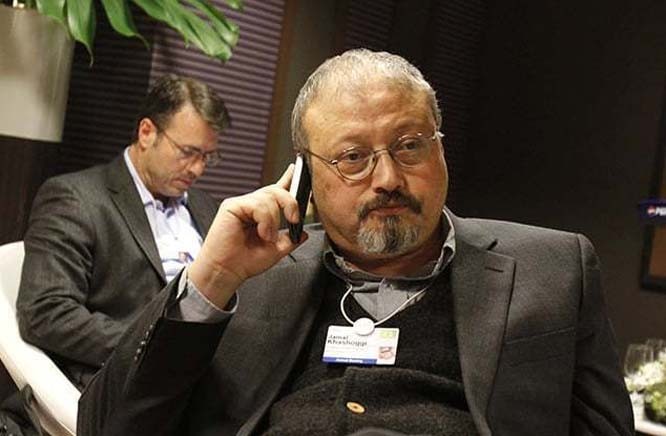
There are lessons to learn from the murder of Jamal Khashoggi: journalist always stands tall

Murder in itself is a brutal act. But when the killing is by torture, beheading, chopping the body into piece, like we are told in the case of Saudi journalist, Jamal Khashoggi, the act speaks volumes about hate; about teaching a lesson to the victim and others.
How brutal was his killing? Was he killed for criticising the Saudi royal family? Till further proof is provided, the Khashoggi killing will remain a mystery. Meanwhile, one needs to study his writings, tv interviews and reasons behind such haste in killing him that a special team was sent to Istanbul to murder him inside the Saudi consulate.
Saudi authorities have arrested the suspects who visited Istanbul to allegedly kill Khashoggi. But Turkish President Tayyip Erdogan still doesn’t look satisfied. He is seeking answers to: Where is the body or its remains? And, will the trial of be held in Istanbul where the crime was committed?
Which brings us to the most basic of all questions: why are journalists killed? Are the powerful people so scared of the ‘power of pen’ and ‘voice of dissent’ that they are willing to physically eliminate them? Was Khashoggi such a danger to the people in power that a special team of some 18 highly-trained people was dispatched to Istanbul in two special aircrafts to kill the journalist inside the consulate and to remove all evidence? One is reminded of the inhuman tactic of Nazis or Latin America of 1970s.
A bad judgment. That’s certainly what the killing of Khashaggi is. For now there will be more stories on him and the critical issues he touched on. This is exactly what journalists murders translate into: dead journalists become more dangerous and their stories never die.
Khashoggi’s murder has also exposed individuals, organisations and countries silent on his murder. Personally, I’ve found complete silence of journalist bodies like Pakistan Federal Union of Journalists (PFUJ) shocking. Boastful of a rich history of over 60 years of struggle for freedom of expression, the PFUJ now stands divided into four factions. And, rather ironically, none of the four factions has held a protest demonstration or even issued a statement after the killing of Khashoggi.
His story has already brought Turkey, Saudi Arabia and the US head on. In all likelihood this mystery will never be solved. But certainly he was not as threatening alive as he is today after his death.
Journalists get killed when they cross the ‘red line’. They get killed while covering conflicts or exposing the underworld. Post 9/11, journalists became targets of non-state actors and at times the state agencies. The death toll of journalists killed in Iraq, Afghanistan and Syria after 2001 crossed the horrendous 1,000 figure.
Pakistan is among the five most dangerous countries for reporting due to rising conflicts in Balochistan, Khyber Pakhtunkhwa, FATA and Karachi, with over 120 killed. The most prominent cases are of US reporter Danial Pearl, Hayatullah Khan, Saleem Shahazad and Wali Khan Babar.
Prime Minister Imran Khan is in a flux over Khashoggi: Pakistan had to be cautious when it became obvious some big names were involved in the killing and especially since Pakistan was desperately seeking Saudi financial assistance worth $6.5 billion package, alongside other incentives, like relaxation in visa fee for workers. I doubt Pakistan can play a mediating role in Yemen but it can depend on Track-II diplomacy at the highest government level. For now though Khashoggi’s murder has overshadowed the investment conference held in Riyadh last month.
Media freedom cannot be achieved without freedom of an individual. However, this age of information and an era of terrorism have threatened both freedom of an individual and freedom of media.
Khashoggi’s murder reminds me of an editorial written by Lasantha Wickrematunga, Editor, The Sunday Leader, where he predicted his murder and possible murders in Jan 2009. Three days before being killing, he accused the then Sri Lankan President Mahinda Rajapaska of his murder. He wrote, "With the wake of my death I know you will make all the usual sanctimonious noises and call upon the police to hold swift and thorough inquiry. But, like all the previous inquiries you have ordered nothing will come out with this one, too. For truth be told, we both know who will be behind my death, but dare not call his name. Not just my life, yours too depends on it.
He concludes, "…as for me, I have the satisfaction that I walked tall, bowed to no man. You will never be allowed to forget that my death took place under your watch. As anguished as I know you will be, I also know that you will have no choice but to protect my killers. You will see to it that no one is ever convicted. You have no choice."
The two were close friends. They addressed each other with first names. Their differences became apparent when Wickrematunga started exposing corruption scandals involving Rajapaska.
This may well be true in Khashoggi’s case, perhaps, in a different context.